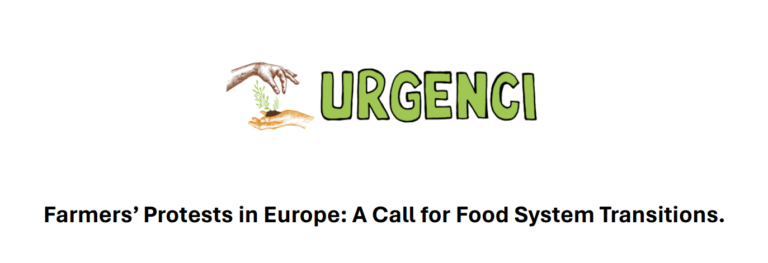[Caen, 14th March 2024] – In recent weeks a rise in farmers’ protests throughout Europe, signalling a crucial moment with potentially profound political ramifications. These movements, while somewhat diverse in their grievances, merge around some key demands, underscoring the urgent need for a meaningful food system transition.
Farmers’ demands:
At the heart of these protests lies a profound sense of societal neglect felt by farmers. The proliferation of free trade neoliberal market mechanisms has widened the gap between producers and consumers, exacerbating feelings of alienation and lack of recognition within society. Essentially small and medium sized farmers cannot make a decent living from working the land, in spite of their dedication to feeding people. They are calling for stable, fairer prices that take their production costs into account.
Farmers are denouncing the inequities inherent to the current economic structures and systems, particularly concerning price volatility and the lack of price regulation that they are paid for their products. The increasing dominance of multinational purchasing groups in global markets has left farmers vulnerable to exploitation and marginalization. Farmers must be paid a fair price that reflects production costs, and should be supported in this approach, rather than having to compete with imported produce. A key demand in this sense is to remove agriculture from the WTO and end Free Trade Agreements for agricultural produce.
Farmers also feel let down by States and the European Union in the environmental transition, and are demanding greater financial support and assistance to help them in adopting sustainable agricultural practices. It is essential to protect biodiversity and the environment: no pollinators, no fruit and vegetables. Much of the answer to this lies in agroecology and agroforestry.
Decent prices for small-scale farmers that allow them to make a living and environmental standards are not mutually exclusive, and we know that it is possible to produce food in an environmentally respectful manner through agroecology and agroforestry.
No to New Breeding Techniques and GMOs in general! If New Breeding Techniques are introduced, as the industrial lobby of the European Commission would like, all traditional open-pollinated varieties used by most CSA farmers would become contaminated. This is a key demand for Urgenci!
The Role of CSAs and LSPAs:
Community Supported Agriculture (CSA) initiatives and Local and Solidarity-based Partnerships emphasize sustainable territorial food systems, community solidarity, gender equality, economic resilience, and environmental sustainability.
It is crucial to recognize that while there are points of convergence among farmers’ protests, there are also significant differences in contexts and demands. The industrial conventional agricultural model, with its focus on efficiency and on quantity, contrasts sharply with the agroecological participatory CSA and LSPA model, which prioritizes community and solidarity.
But despite these differences and the catastrophic consequences of the industrial food lobby, as well as of the neoliberal food systems and free trade agreements that are exacerbating economic injustice, farmers are all demanding nothing short of a dignified living wage and fair prices for their produce.
URGENCI’s pillars are and remain Food Sovereignty and Social Solidarity Economy, and now more than ever, it is imperative to defend human rights. The right to food must protect farmers and consumers alike.
The transition towards equitable and sustainable food systems cannot be ignored. In a sector marked by the daily loss of many farms and an aging population of farmers, CSAs and LSPAs can meet the challenges producers usually face alone through their collective approach and provide the necessary tools to navigate these transitions and build a more sustainable and equitable model that can sustain and feed the people and protect the planet in a fair and equitable way.


